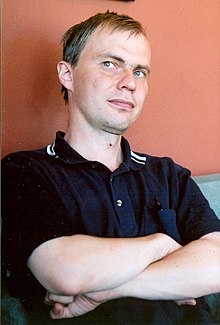Aarne Ruben
Aarne Ruben (born July 17, 1971 in Tallinn ) is an Estonian writer and semiotic.
Life
Aarne Ruben graduated from high school in Rapla in 1990 and worked as a journalist after completing his military service. In 2001 he started studying Estonian language and literature at the Tallinn University of Education , which he graduated in 2006. Two years later he was awarded with a thesis on Karl Ristikivi the master's degree . Since then he has been active both scientifically and as a writer.
Ruben has been a member of the Estonian Writers' Union since 2000 .
Literary work
Ruben made his debut in a poem slipcase with several others in 1993 and has been called "probably the most gifted" author. He submitted another volume of poetry, but then switched to prose, often dealing with subjects or people from Estonian history. Here he sometimes uses a collage technique and deliberately moves on the border with non-fiction. This "combination of historical subjects with unconventional techniques was a novelty in Estonian literature."
His greatest success to date was the novel Volta howls pitifully (2001), with which he won first prize in the novel competition. The title alludes to a novel by Anton Hansen Tammsaare , who in the third part of his pentalogy Truth and Law writes the sentence in the second paragraph of the opening chapter: "But as soon as he had stopped his step, there was a howling, almost plaintive, factory siren." the situation in Tallinn at the time of the revolution of 1905 was characterized. Since Volta was a well-known factory in Tallinn, the readership automatically made the correct historical classification. However, the novel treats the said revolution only marginally, rather the entire first third of the 20th century of Estonian history is presented. In addition, the novel contains an account of the history of Dadaism and aims to be a Dadaist novel itself, which is illustrated by the lack of a period at the end. With its postmodern influence, the novel was also seen as a "commentary or paraphrase on all of Estonian literature".
Awards
- 2000 First prize in the Estonian novel competition
bibliography
- Raevule ('To anger'). Tallinn: Eesti Raamat 1993. 63 pp. (Cassette 92)
- Ajakirjanik ('The Journalist'). Tallinn: sn 1994. 40 pp.
- Vares-Barbaruse valitsus ('The Government of Vares-Barbarus'). Tallinn: SE&JS 2001. 246 pp.
- Volta annab kaeblikku vilet ('Volta howls miserably'). Tallinn: Tänapäev 2001. 346 pp.
- Elajas trepi eelastmel (The beast 'on the landing '). Tallinn: Tuum 2004. 237 pp.
- Lugusid Anveltist yes Kingissepast ('Stories of Anvelt and Kingissepp '). Tallinn: Eesti Keele Sihtasutus 2007. 192 pp.
- Ärid kuuliaukudega majades ('shops in houses with bullet holes'). Tallinn: Eesti Raamat 2009. 235 pp.
- Viimne kohtupäev ('The Last Judgment'). Tallinn: Eesti Raamat 2010. 151 pp.
- Püstol Waltheriga metsikutes laantes ('With a Walther in wild forests'). Tallinn: Eesti Raamat 2011. 207 pp.
- Ilusast naisest ei saa head muumiat ('You can't get a good mummy from a beautiful woman'). Muraste: Randvelt Kirjastus 2011. 299 pp.
- Karl Kiilaspea pärijad ('The Heirs of Karl Kiilaspea'). Tartu: Fantaasia 2013. 200 pp.
- Talvehommiku härmas kindakirjad: mõistuslik lugu Djatlovi kurust ('Frosted glove samples one winter morning. The enigmatic story of the Djatlow Pass '). Tartu: Fantaasia 2016. 126 pp.
Literature on the author
- Aadu Hurt: Umbmõtteid revolutsioonilisest Rubenist, in: Vikerkaar 1/1995, pp. 94–95.
- Andres Ehin : Mispärast valley see Volta meeles mõlkus ?, in: Looming 9/2001, pp. 1420–1423.
- Heino Arumäe: Ääremärkusi Vares-Barbaruse valitsuse asjus, in: Tuna 1/2002, pp. 133-137.
- Berk Vaher : Campus interruptus, in: Looming 8/2004, pp. 1253–1257.
- Udo Uibo : Kommunistlik apokriiva, in: Looming 11/2007, pp. 1747–1749.
- Olev Remsu : Detailiteos, in: Looming 5/2011, pp. 721-723.
- Mart Kuldkepp: Aleksander Kesküla kirjandustegelasena, in: Keel ja Kirjandus 12/2014, pp. 897–910.
Web links
Individual evidence
- ↑ Barbi Pilvre: Nelja's "Kauba peale"? - Mustad jõud, valged jõud, kalbed kuningad ja verevaene jaht, in: Looming 6/1994, p. 849.
- ↑ Cornelius Hasselblatt : History of Estonian Literature. From the beginning to the present. Berlin, New York: Walter de Gruyter 2006, p. 785.
- ^ Anton Hansen Tammsaare. When the storm is silent. A novel about the year 1905. Leipzig: Paul List Verlag 1983, p. 5.
- ↑ Cornelius Hasselblatt: 1905. aasta eesti romaanis, in: Keel ja Kirjandus 11/2007, p. 874.
- ↑ Aarne Ruben: Volta annab kaeblikku vilet . Tallinn: Tänapäev 2001, p. 347.
- ↑ Berk Vaher: Campus interruptus, in: Looming 8/2004, p. 1253.
- ↑ Review (English) in Estonian Literary Magazine 13 (2001), pp. 40–41 ( Memento of the original from August 7, 2012 in the Internet Archive ) Info: The archive link was inserted automatically and has not yet been checked. Please check the original and archive link according to the instructions and then remove this notice.
- ↑ Review (English) in Estonian Literary Magazine 19 (2004), pp. 39–40. ( Memento of the original from July 22, 2012 in the Internet Archive ) Info: The archive link was automatically inserted and not yet checked. Please check the original and archive link according to the instructions and then remove this notice.
| personal data | |
|---|---|
| SURNAME | Ruben, Aarne |
| BRIEF DESCRIPTION | Estonian writer |
| DATE OF BIRTH | 17th July 1971 |
| PLACE OF BIRTH | Tallinn |
